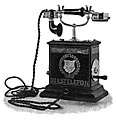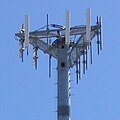Portal:Telephones

A telephone, colloquially referred to as a phone, is a telecommunications device that permits two or more users to conduct a conversation when they are too far apart to be easily heard directly. A telephone converts sound, typically and most efficiently the human voice, into electronic signals that are transmitted via cables and other communication channels to another telephone which reproduces the sound to the receiving user. The term is derived from Ancient Greek: τῆλε, romanized: tēle, lit. 'far' and φωνή (phōnē, voice), together meaning distant voice.
In 1876, Alexander Graham Bell was the first to be granted a United States patent for a device that produced clearly intelligible replication of the human voice at a second device. This instrument was further developed by many others, and became rapidly indispensable in business, government, and in households. (Full article...)

A mobile phone or cell phone is a portable telephone that can make and receive calls over a radio frequency link while the user is moving within a telephone service area, as opposed to a fixed-location phone (landline phone). The radio frequency link establishes a connection to the switching systems of a mobile phone operator, which provides access to the public switched telephone network (PSTN). Modern mobile telephone services use a cellular network architecture, and therefore mobile telephones are called cellphones (or "cell phones") in North America. In addition to telephony, digital mobile phones support a variety of other services, such as text messaging, multimedia messaging, email, Internet access (via LTE, 5G NR or Wi-Fi), short-range wireless communications (infrared, Bluetooth), satellite access (navigation, messaging connectivity), business applications, payments (via NFC), multimedia playback and streaming (radio, television), digital photography, and video games. Mobile phones offering only basic capabilities are known as feature phones (slang: "dumbphones"); mobile phones that offer greatly advanced computing capabilities are referred to as smartphones. (Full article...)
A smartphone, often simply called a phone, is a mobile device that combines the functionality of a traditional mobile phone with advanced computing capabilities. It typically has a touchscreen interface, allowing users to access a wide range of applications and services, such as web browsing, email, and social media, as well as multimedia playback and streaming. Smartphones have built-in cameras, GPS navigation, and support for various communication methods, including voice calls, text messaging, and internet-based messaging apps. (Full article...)
Selected article -
A collect call in Canada and the United States, known as a reverse charge call in other parts of the English-speaking world, is a telephone call in which the calling party wants to place a call at the called party's expense.
Collect calls were originally only possible as an operator-assisted call, but with the introduction of computer-based telephone dialing equipment, it became possible to place a collect call without using an operator. Automated reverse charge dialing eliminated a service that could be provided, at a higher fee, only on operator-assisted connections: the person-to-person call, in which there is no charge unless a designated person is available.
In the US, while Mother's Day is the holiday with the highest number of phone calls, the day with the most collect calls is Father's Day. (Full article...)
Types of phones -

A secure telephone is a telephone that provides voice security in the form of end-to-end encryption for the telephone call, and in some cases also the mutual authentication of the call parties, protecting them against a man-in-the-middle attack. Concerns about massive growth of telephone tapping incidents led to growing demand for secure telephones.
The practical availability of secure telephones is restricted by several factors; notably politics, export issues, incompatibility between different products (the devices on each side of the call have to use the same protocol), and high (though recently decreasing) price of the devices. (Full article...)
Selected audio -
In telephony, a special information tone (SIT) is an in-band international standard call progress tone consisting of three rising tones indicating a call has failed. It usually precedes a recorded announcement describing the problem. (Full article...)
List articles

- Comparison of smartphones
- List of best-selling mobile phones
- List of countries by number of broadband Internet subscriptions
- List of countries by number of telephone lines in use
- List of countries by smartphone penetration
- List of country calling codes
- List of iPhone models
- List of mobile network operators
- List of mobile phone brands by country
- List of mobile phone generations
- List of telecommunications companies
Related portals
General images -
Selected biography
Alexander Graham Bell (/ˈɡreɪ.əm/, born Alexander Bell; March 3, 1847 – August 2, 1922) was a Scottish-born Canadian-American inventor, scientist, and engineer who is credited with patenting the first practical telephone. He also co-founded the American Telephone and Telegraph Company (AT&T) in 1885.[additional citation(s) needed]
Bell's father, grandfather, and brother had all been associated with work on elocution and speech, and both his mother and wife were deaf, profoundly influencing Bell's life's work. His research on hearing and speech further led him to experiment with hearing devices, which eventually culminated in his being awarded the first U.S. patent for the telephone, on March 7, 1876. Bell considered his invention an intrusion on his real work as a scientist and refused to have a telephone in his study.
Many other inventions marked Bell's later life, including groundbreaking work in optical telecommunications, hydrofoils, and aeronautics. Bell also had a strong influence on the National Geographic Society and its magazine while serving as its second president from 1898 to 1903. (Full article...)
Selected images
Topics
Subcategories

More
 |
Here are some tasks awaiting attention:
|
Telephones in the news
- 15 November 2024 – Russian invasion of Ukraine, Germany–Russia relations
- German Chancellor Olaf Scholz holds a telephone call with Russian President Vladimir Putin about the war in Ukraine, their first contact since 2022. Putin tells Scholz that any negotiated settlement to end the war must recognize the territories that Russia has occupied as part of Russia and that Ukraine must abandon its aspiration to join NATO. (AP) (The New York Times)
- 29 October 2024 –
- Four people are injured after a derailed tram crashes into a phone and computer shop in central Oslo, Norway. (Euronews)
Associated Wikimedia
The following Wikimedia Foundation sister projects provide more on this subject:
-
Commons
Free media repository -
Wikibooks
Free textbooks and manuals -
Wikidata
Free knowledge base -
Wikinews
Free-content news -
Wikiquote
Collection of quotations -
Wikisource
Free-content library -
Wikiversity
Free learning tools -
Wiktionary
Dictionary and thesaurus















































































































